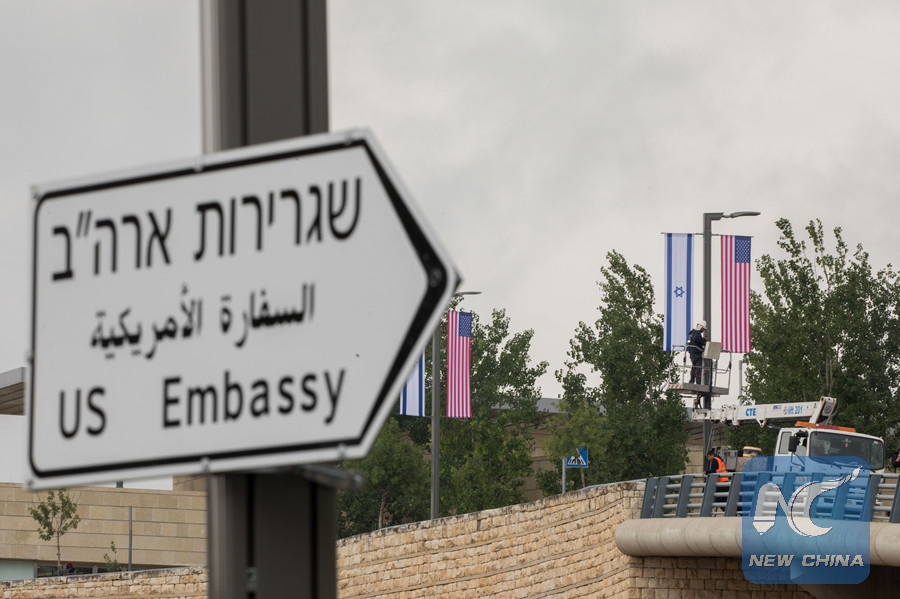
Palestinians carry a demonstrator injured during clashes with Israeli forces near the border between Gaza and Israel on May 14, as Palestinians protest over the inauguration of the U.S. embassy following its controversial move to Jerusalem. (AFP photo)
RAMALLAH, June 26 (Xinhua) -- The U.S. government has accelerated steps to announce its Middle East peace plan, known as the deal of the century, to resolve the Palestinian-Israeli conflict despite Palestinian rejection of the initiative.
On Sunday, U.S. President Donald Trump's senior advisor Jared Kushner told Palestinian Al-Quds newspaper that the United States will announce its peace plan soon.
Kushner and U.S. presidential senior envoy Jason Greenblatt are currently visiting Israel as part of a regional tour to meet officials of Israel, Saudi Arabia, Qatar, Egypt and Jordan.
While Kushner refused to reveal details of the plan, Israeli reports said the U.S. initiative suggests that Abu Dis village in East Jerusalem will be the capital of the future "unarmed" Palestinian state.
The reports also said the U.S. government will ask Israel to withdraw from three quarters of Arab neighborhoods in East Jerusalem, adding that Israel will maintain control of major settlements in West Jerusalem as well as the Jordan Valley.
Saeb Erekat, secretary of the Executive Committee of the Palestine Liberation Organization (PLO), accused the Trump administration of preparing to bring down the Palestinian leadership because of its rejection to the deal.
Washington "has isolated itself from the peace process and become part of the problem, not a solution," he said.
Ghassan Khatib, a professor of political science at Birzeit University in Ramallah, believes that the Trump administration does not achieve tangible success in its quest to resume the peace process.
"The U.S. peace plan is entirely biased to Israel and is totally rejected by Palestinians and Arab states," Khatib told Xinhua.
This bias is why the U.S. efforts are rejected, he said, adding that the unprecedented crisis in the Palestinian-U.S. relations will negatively affect any expected American efforts.
The Palestinian Authority has boycotted the U.S. government since last December, when President Trump recognized Jerusalem as Israel's capital and moved its embassy from Tel Aviv to the disputed holy city.

Jerusalem municipal workers install U.S. and Israeli flags, as well as the U.S. embassy direction signs, near the U.S. Consulate General in Jerusalem, on May 7. (Xinhua/Ji Ni)
The Palestinians have since excluded the United States from the Middle East peace sponsors, and turned to Europe and other countries for a multilateral sponsorship.
But Mohammad Hejazi, a Gaza-based writer and political analyst, warned that "the internal Palestinian division stands as an obstacle to a unified stance in the face of the U.S. plan" despite a Palestinian consensus on rejecting the potential U.S. deal.
The Palestinian position will remain weak as long as the Palestinians are not united politically, he added.
Regarding the Arab position, Hejazi noted that the Arab countries cannot abandon their historical stance which demands an independent Palestinian state on the territories occupied in 1967 with East Jerusalem as its capital.
On Monday, Palestinian Presidential Spokesman Nabil Abu Rudeina said the U.S. must realize that it cannot avoid the international legitimacy or the Palestinian and Arab constants over the Palestinian issue.
"The road to peace is clear, a Palestinian state with East Jerusalem as its capital within the framework of an international mechanism, according to a specific timeframe. Otherwise all U.S. efforts will not lead to any results," he noted.
Commenting on the recent political developments over the issue, Hani al-Masri, a West Bank think-tank member and political analyst, said the ongoing tour of U.S. officials is meant to impose the deal of the century on the Palestinian side through the pressure of Arab countries.
Washington is trying to implement its plan through an economic entrance such as offering humanitarian facilities, especially to the Israeli-blockaded Gaza Strip, al-Masri noted.
The official position of the Arab countries rejects the U.S. deal, as they will not be able to approve it without a Palestinian blessing, he said.
However, the Palestinian leadership will not be able to challenge the deal without the preparation of a clear plan to end the internal division between the Islamic Hamas movement which rules the Gaza Strip and Fatah party based in the West Bank, he pointed out.
"In addition, the Palestinian leadership needs to intensify diplomatic action with countries advocating the Palestinian position," al-Masri told Xinhua.

